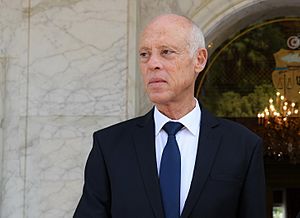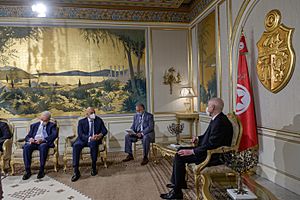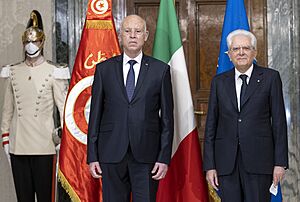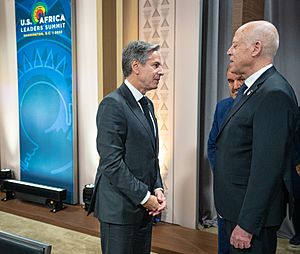Kais Saied facts for kids
Quick facts for kids
Kais Saied
|
|
|---|---|
| قَيْس سْعَيِّد | |
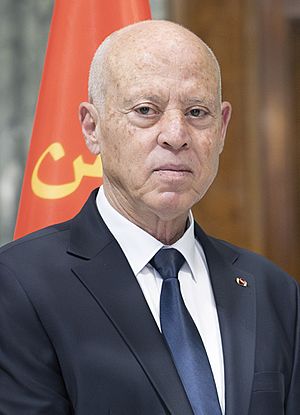
Saied in 2023
|
|
| 5th President of Tunisia | |
| Assumed office 23 October 2019 |
|
| Prime Minister |
|
| Preceded by | Mohamed Ennaceur (acting) |
| Personal details | |
| Born | 22 February 1958 Tunis, Tunisia |
| Political party | Independent |
| Spouse | Ichraf Saied |
| Children | 3 |
| Alma mater | University of Tunis International Institute of Humanitarian Law |
| Profession | Jurist, lecturer in law |
| Signature | |
Kais Saied (born 22 February 1958) is a Tunisian politician and legal expert. He has been the fifth president of Tunisia since 2019. Before becoming president, he was a professor who taught law. He also led the Tunisian Association of Constitutional Law for many years.
In 2019, Saied ran for president as an independent candidate. He promised to fight against corruption and was popular with many people. He won the election with a large number of votes and became president on 23 October 2019. In October 2024, he was re-elected for a second term.
As president, Saied has made significant changes to Tunisia's government. In 2021, he suspended the parliament and removed the prime minister. He then ruled by special orders until a new constitution was approved in 2022. This new constitution gave him more powers. He also made changes to the country's justice system and arrested some political figures.
Contents
Early Life and Education
Kais Saied was born on 22 February 1958. His parents are Moncef Saied and Zakia Bellagha. His family was known for being intellectual, even though they were not wealthy. His uncle, Hicham Saïed, was a famous surgeon in Tunisia. Kais Saied went to Sadiki College for his secondary education.
Professional Career
Saied is an expert in constitutional law, which is the study of a country's main laws. He worked as a secretary-general for the Tunisian Association of Constitutional Law from 1990 to 1995. Later, he became the vice-president of this association.
He was also a director in the public law department at the University of Sousse and the University of Carthage. Saied was part of a group of experts for the Arab League and helped revise the Tunisian Constitution in 2014. He retired from teaching in 2018.
Political Journey
Starting in Politics
From 2013 to 2014, Kais Saied joined various political groups and meetings. These groups often included young people. In 2016, a movement called Mouassissoun was created to support Saied's ideas and projects.
2019 Presidential Campaign
Saied was one of the first people to announce they would run for president in 2019. He ran as an independent candidate. He wanted to connect with younger voters. One of his ideas was to allow citizens to remove elected officials from office if they were not doing a good job.
He believed that many of Tunisia's problems came from not following constitutional laws. Saied also presented a plan to fight against corruption. He was supported by different political groups.
Saied also shared his views on international relations. He strongly supports the Palestinian cause. He believes that having official relations with Israel is a serious issue for Tunisia. He has stated that Tunisia has no problem with Jewish people. He mentioned that Tunisians, including his own father, protected Jewish people during World War II.
He also suggested a new way of electing national representatives. He thought local representatives should be chosen based on their good character, not just their political ideas. Because he was not very well-known and did not campaign much, some of his views were not fully clear.
Many media sources called Saied "RoboCop." This was because of his calm voice and his use of formal Arabic instead of the local Tunisian dialect. He also focused a lot on law and order. During his campaign, Saied presented himself as a leader for ordinary people. He won the first round of the 2019 election and then won the second round with 72.71% of the votes. He became the new President of Tunisia.
2024 Presidential Campaign
Kais Saied ran for president again in the 2024 Tunisian presidential election. This election took place on 6 October. On 7 October 2024, the election officials announced the results. Kais Saied was re-elected as president of Tunisia with 90.69% of the votes. He began his second term on 21 October 2024.
President of Tunisia
Saied officially became Tunisia's president on 23 October 2019. He is the first president of Tunisia who was born after the country gained independence from France in 1956.
Taking Office
After the election results were confirmed, Kais Saied chose his brother Naoufel, who is also a law professor, to help him pick his presidential team. On 23 October, Saied took his oath at the Presidential Palace of Carthage. He promised to fight against terrorism and protect the rights of Tunisian women.
First Actions as President
Saied chose not to live in the official presidential palace. Instead, he preferred to stay in his own home in Mnihla. Soon after taking office, he appointed several key people to his team. These included a diplomat to lead his presidential office and a national security adviser.
Forming a Government
Tunisia has a semi-presidential system, meaning the president and prime minister share power. Saied had to choose a prime minister to form a government. On 15 November 2019, he appointed Habib Jemli. However, the parliament rejected Jemli's proposed government.
Saied then appointed Elyes Fakhfakh as the new prime minister on 20 January 2020. Fakhfakh's government was approved by the parliament in February. In July 2020, Fakhfakh resigned. Saied then appointed Hichem Mechichi as the head of government on 25 July 2020. Mechichi took office in September 2020.
Major Government Changes in 2021
On 25 July 2021, after protests against the government and a growing health crisis, Saied took significant actions. He suspended the parliament for a month and removed Prime Minister Hichem Mechichi from his job. He also took over executive power. These actions were seen by some as a major shift in power.
Saied extended the parliament's suspension in August 2021. In September, he announced that he would rule by special orders and not follow some parts of the constitution. He appointed Najla Bouden as the new Prime Minister in September 2021. Protests against his increased power continued.
In December 2021, Saied extended the parliament's suspension until new elections could be held. He also announced a public discussion to gather ideas for a new constitution. A committee of experts then drafted a new constitution, which was put to a public vote on 25 July 2022.
In February 2022, Saied dissolved the Supreme Judicial Council, which is the body that oversees judges. He later appointed a temporary council. After the public vote on the new constitution, which passed with 90% support (though only 30.5% of voters participated), Saied declared victory. He said Tunisia would enter a new phase with his increased powers.
Views on Immigration

In February 2023, Saied spoke about immigration from other African countries into Tunisia. He suggested that these migrants were changing the population of the country. In 2023, more migrants from Africa tried to cross from Tunisia to Europe. This was partly due to increasing anti-immigration feelings and discrimination against Black Africans in Tunisia.
Leaders from Italy and the European Union tried to make a deal with Saied. This deal aimed to stop illegal migration from Tunisia to Europe. In September 2023, many boats carrying thousands of migrants arrived on the Italian island of Lampedusa from Tunisia.
Press Freedom
In September 2022, President Kais Saied signed a new law called Decree Law 54. This law aimed to fight against "false information and rumors" on the internet. Article 24 of this law states that anyone found spreading such information could face up to five years in prison and a large fine. The punishment is even stricter if the information is about a government official.
Environmental Concerns
In 2023, Tunisia faced a shortage of water because of climate change. This led the government to limit water use in some areas. Also, in May 2023, the government announced that the wheat harvest was much smaller than usual. This meant Tunisia had to import most of its grain, leading to bread rationing and some bakeries closing. While Saied's government has tried to address these issues, a survey showed that Tunisians were very unhappy with efforts to protect the environment.
Personal Life
Kais Saied is married to Ichraf Chebil, who is a judge. They met when she was a law student. They have three children: two daughters named Sarah and Mouna, and a son named Amrou. Saied enjoys classical Arab music and Arabic calligraphy. Many of his supporters affectionately call him "Kaisoun."
Honours
National Honours
- Grand Master and Grand Collar of the Order of Independence
- Grand Master and Grand Collar of the Order of the Republic
- Grand Master and Grand Collar of the National Order of Merit of Tunisia
Foreign Honours
 Algeria: Collar (Athir Class) of the National Order of Merit (2 February 2020)
Algeria: Collar (Athir Class) of the National Order of Merit (2 February 2020) Palestine: Grand Collar of the State of Palestine (8 December 2021)
Palestine: Grand Collar of the State of Palestine (8 December 2021)
Other Recognitions
- 2021: Honorary degree from Sapienza University of Rome
- 2021: Arab League' Honor Plaque
- 2022: Honorary Gold Medal of the Council of Arab Interior Ministers
- 2023: Medal of Arab tourism
Images for kids
See also
 In Spanish: Kaïs Saied para niños
In Spanish: Kaïs Saied para niños


